Leora J. Goodin
I'm a blogger dedicated to sharing insights on lifestyle and wellness. Through personal stories and practical tips, I aim to inspire and empower my readers to lead healthier, more fulfilling lives.
Students and teachers save a massive 71% on Creative Cloud All Apps
Black Friday and Cyber Monday 2023 Deals for Motion Designers, grab it now!
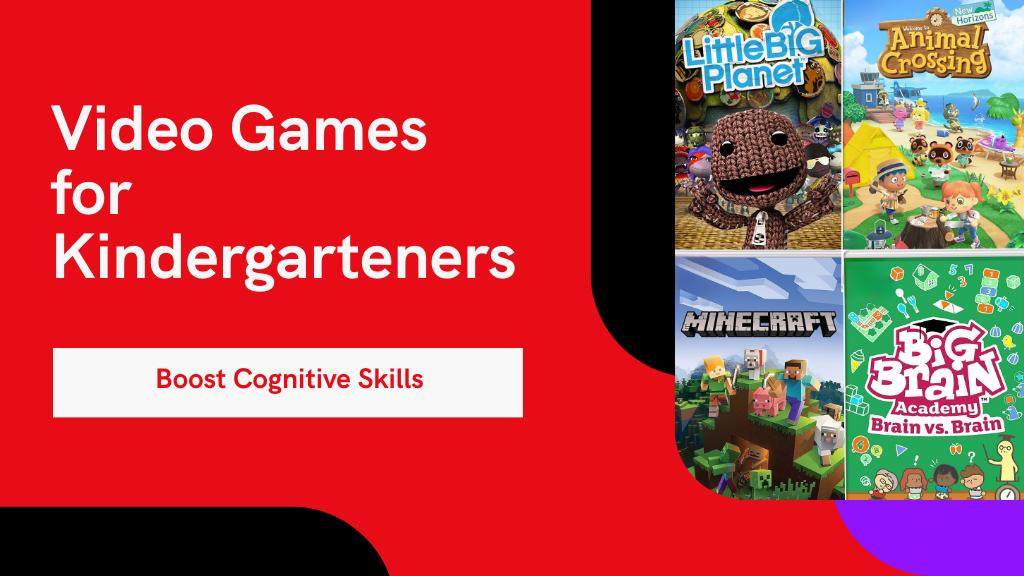
Creative, colorful, and captivating, these 7 video games for kindergarteners boost learning in surprising ways you’ll want to discover today.

You’ll find video games like Little Big Planet, Minecraft, and Animal Crossing great for boosting your kindergartner’s creativity, problem-solving, and social skills. Games such as Big Brain Academy and Death Squared help develop critical thinking and teamwork in a fun, colorful setting. These games use simple controls and adapt to your child’s skill level, making learning enjoyable and engaging. If you want to discover specific titles and their unique benefits, there’s plenty more to explore.
While you might think video games are just for fun, those designed for kindergarteners can actually boost important cognitive skills like memory, attention, and problem-solving.
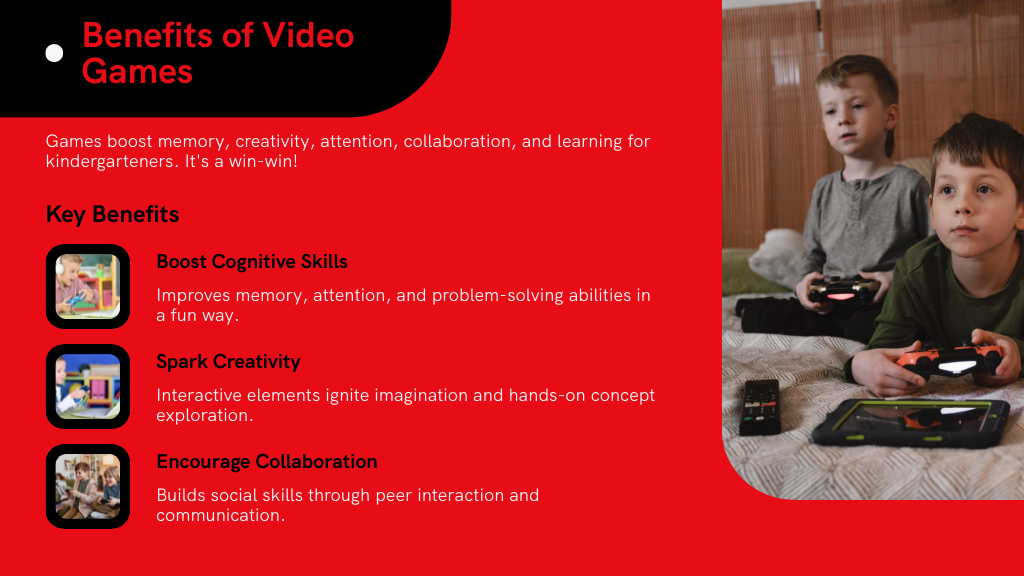
Kid friendly games often include interactive elements that spark creativity and imagination, helping you explore concepts hands-on. Popular video games for children don’t just entertain—they also encourage collaboration and communication, building essential social skills as you play with peers.
Many video games for kindergarteners adapt to your individual skill level, keeping challenges just right to stay motivated. Plus, these games support foundational learning in reading, math, and science, making early education engaging and effective.
Because choosing the right educational games can shape your kindergartener's learning experience, it's important to focus on specific criteria.
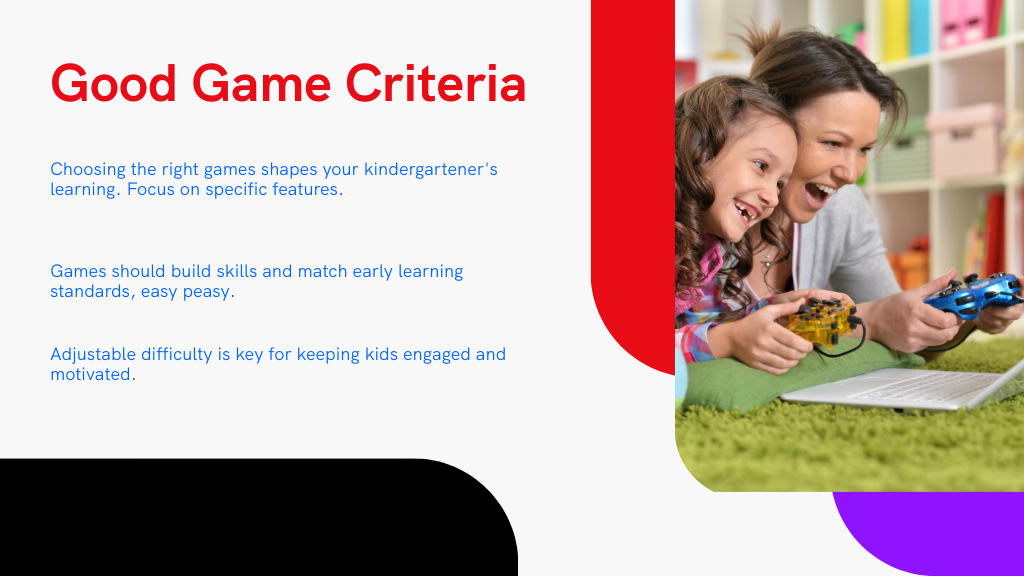
When picking video games for kids, look for those that build foundational skills like problem-solving and creativity while matching early learning standards. Video games for 4 year olds and 5 year olds should have simple controls and age-appropriate content to keep frustration low and engagement high.
Adjustable difficulty settings are key, letting you tailor the challenge to your child’s skill level. Also, prioritize games that encourage collaboration and communication to boost social skills.
Finally, choose games that reward achievements positively, fostering motivation and a genuine love for learning. Sticking to these criteria guarantees your child enjoys both educational value and fun.
You'll enjoy customizing Sackboy and creating your own levels, which sparks creativity and personal expression. The game encourages teamwork as you solve puzzles together, building collaboration skills. Plus, designing and sharing levels helps develop your problem-solving and game design abilities.
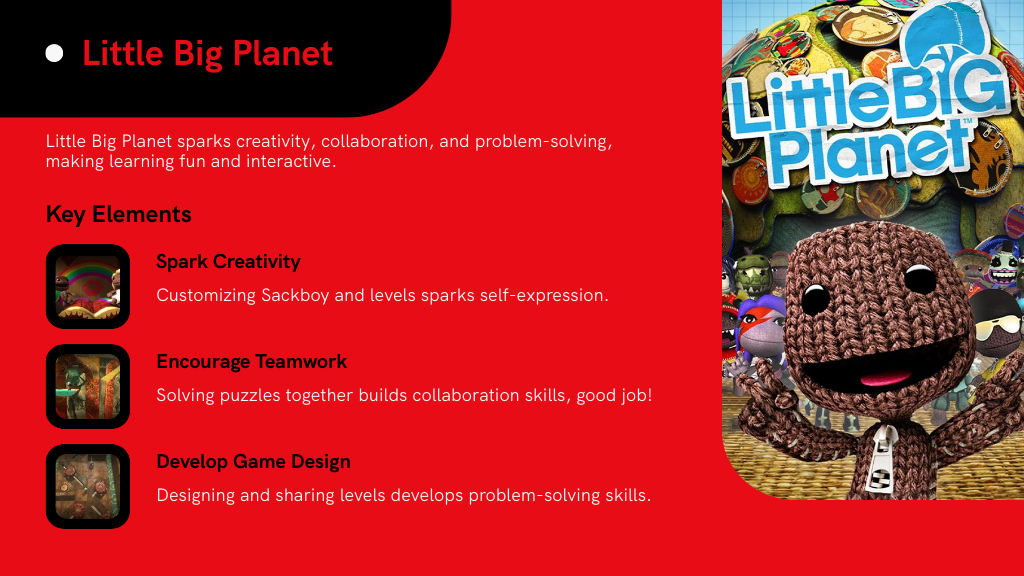
If you love expressing yourself, the Little Big Planet series offers a fun way to create and customize your own Sackboy characters. You get to design unique outfits and styles, making your Sackboy truly yours.
Beyond characters, you can build and share custom levels, sparking creativity as you design challenges and environments. This hands-on creation helps you learn about spatial reasoning, physics, and gravity in a playful setting.
Sharing your levels with an online community lets you see how others play and get inspired. The game’s focus on creativity and customization encourages you to think critically about design and gameplay, making it an engaging way to develop problem-solving skills while having fun on your PlayStation.
While exploring the Little Big Planet series, you’ll notice how teamwork plays a key role in solving puzzles and moving through levels. You and your friends each bring unique skills to the table, encouraging you to communicate and share ideas to overcome challenges together.
This cooperative gameplay helps you develop important collaboration skills, like listening and problem-solving, which are valuable both in the game and real life. As you work side by side, you’ll engage critical thinking while figuring out puzzles that require collective effort.
The game’s colorful visuals and interactive design make this experience fun and motivating, showing you the power of cooperation. Through teamwork in Little Big Planet, you learn that combining your strengths can achieve success in playful, meaningful ways.
Building on the teamwork skills you've practiced in Little Big Planet, the game also sparks your creativity by letting you design and customize your own levels.
As Sackboy, you explore a vibrant world filled with objects and obstacles that challenge your problem-solving abilities. Using easy-to-understand tools, you can create unique environments, experimenting with physics and world-building concepts.
This hands-on approach not only boosts your imaginative thinking but also introduces you to basic game design principles. Plus, you can share your creations with a community of players, encouraging collaboration and communication.
Little Big Planet turns you into a young developer, inspiring creativity while reinforcing the importance of teamwork and innovation in a fun, interactive way.

When you plunge into Minecraft, you’ll find a world that sparks creativity and sharpens problem-solving skills through its open sandbox environment. You can explore different biomes, gather resources, and experiment with building using textured cubes.
In Creative Mode, you’re free to design structures without limits, which boosts your imagination and spatial reasoning. Minecraft: Education Edition takes it further by offering lessons that introduce math, science, and teamwork in ways that make learning fun and engaging.
As you play, you’ll also develop critical thinking by managing resources and even dabbling in basic coding. Plus, the multiplayer feature lets you collaborate with friends, encouraging communication and sharing ideas while building and exploring together. Minecraft truly makes learning an interactive adventure.
If you immerse yourself in the Animal Crossing series, you'll discover a charming world that helps develop social skills by letting you interact with friendly animal characters and work with friends to build a vibrant community.
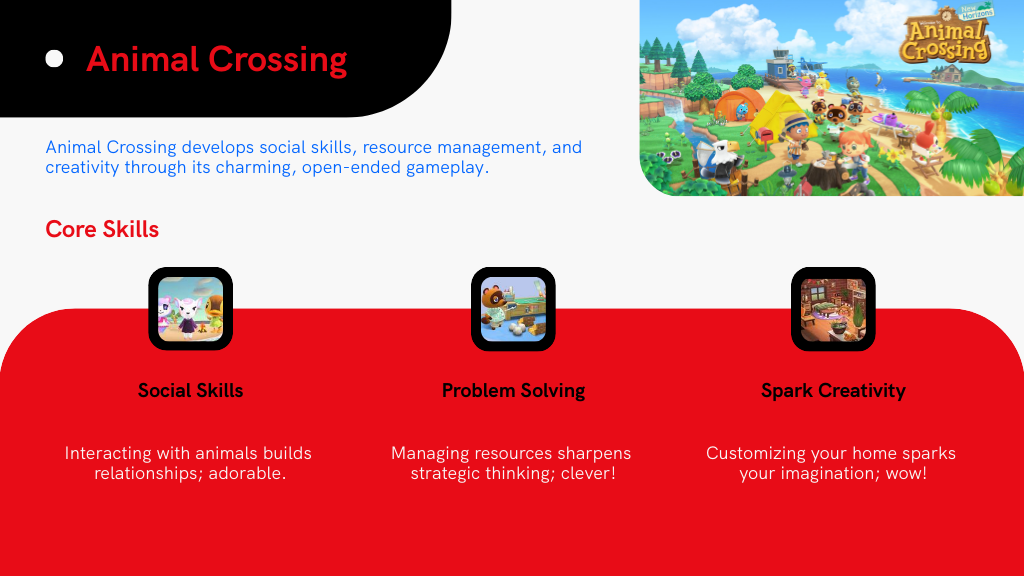
The game encourages communication and relationship-building as you chat and collaborate in multiplayer mode. You'll also sharpen problem-solving skills by managing resources, crafting items, and designing your island layout, which requires planning and strategic thinking.
Balancing daily activities like fishing and bug catching teaches time management, helping you prioritize tasks effectively. Plus, the open-ended gameplay sparks creativity, letting you customize your character, home, and island.
This blend of social interaction and problem-solving makes Animal Crossing an engaging and educational experience for young learners.
While Animal Crossing focuses on social skills and creativity, Big Brain Academy: Brain vs. Brain targets cognitive development through fun puzzles. You’ll find it’s perfect for kindergarteners enthusiastic to boost their thinking skills with engaging challenges across five categories like memory and analysis. The game adapts to your child’s level, encouraging quick thinking and problem-solving.
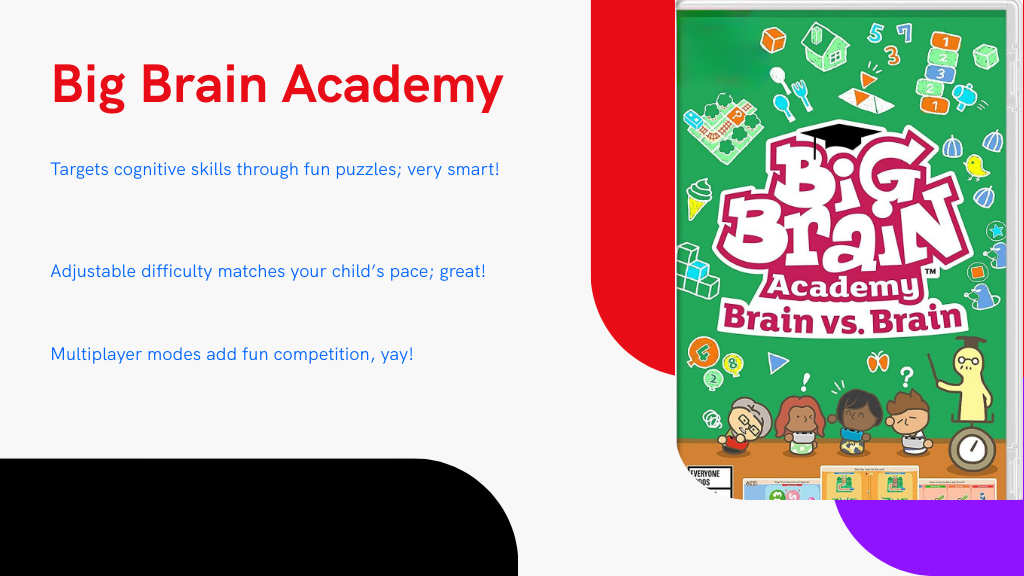
Here’s what makes it great for cognitive growth:
Ideal for cognitive growth with adjustable difficulty, multiplayer fun, progress tracking, and exercises that boost quick thinking.
Big Brain Academy makes learning feel like a game, helping young minds sharpen their brains while having a blast.
In Death Squared, you’ll tackle cooperative puzzle challenges that boost your observation skills and encourage teamwork. You’ll need to communicate clearly and plan your moves together to solve each level. It’s a family-friendly game that makes learning critical thinking fun for everyone.
When you play Death Squared, you’ll quickly see how teamwork and communication are key to solving its colorful, cooperative puzzles.
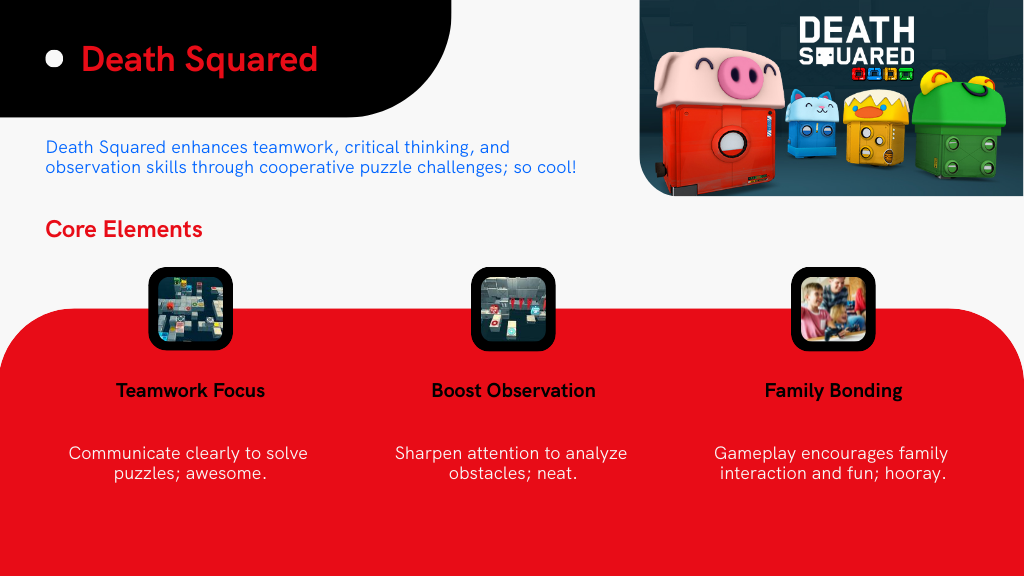
This game encourages you and your little ones to work together, building essential skills like collaboration and problem-solving. As you navigate through levels, you’ll find that coordinating strategies is vital to avoid obstacles and complete challenges.
Here’s what makes Death Squared great for cooperative puzzle challenges:
Because Death Squared challenges you to observe your surroundings closely, you'll quickly sharpen your attention to detail and improve your ability to analyze obstacles.
The game’s puzzles require you to watch carefully, anticipate character movements, and understand spatial relationships to solve problems successfully. As you navigate each level, you’ll notice subtle clues in the environment that guide your decisions.
This focused observation enhances your cognitive skills, like spatial reasoning and critical thinking. Plus, working together with others encourages you to communicate what you see and consider different perspectives.
This cooperative approach not only deepens your understanding of the game but also strengthens your ability to process information quickly and accurately, making Death Squared a powerful tool for boosting observation skills in young learners.
Although it’s designed to challenge your problem-solving skills, Death Squared makes teamwork and communication the heart of its gameplay. You and your family will navigate colorful, engaging puzzles that encourage critical thinking and collaboration, perfect for kindergarteners and older players alike.
This cooperative game:
By blending brainy benefits with boundless fun, these brilliant games bring big boosts to your kindergartener’s learning journey. From crafting creativity in Little Big Planet to mastering teamwork in Death Squared, each game sparks skills that shape social smarts, problem-solving prowess, and cognitive confidence. So, seize the screen time wisely, and watch your little learner’s abilities blossom beautifully through engaging, educational entertainment that’s perfectly pitched for playful progress.

Your email address will not be published. Required fields are marked *